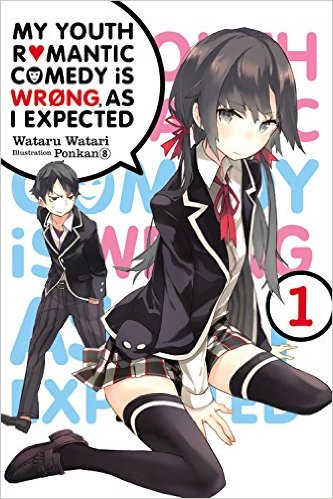By Wataru Watari and Ponkan 8. Released in Japan by Shogakukan. Released in North America by Yen On. Translated by Jennifer Ward.
This is a highly anticipated light novel title, for many reasons. First, the anime proved quite popular in the West, and people wanted to see how the original was, particularly as the anime apparently compressed 11 books into 26 episodes. Secondly, Shogakukan has a number of popular light novel titles, but haven’t really licensed to the West before now except maybe via Viz. But most importantly, this series does not feature anyone trapped in a fantasy world, or trapped in a fantasy game, or anyone acquiring amazing superhero-like powers, or immortals, or dullahans. Heck, there’s not even a girl who eats books. No, instead we get something a bit more down to Earth: a Japanese high school where a cynical and belligerent young man with a sullen face is ordered to join a club devoted to helping others.
Of course, just because there’s no fantasy content does not mean that this series is not going to remind long-time anime and manga fans of other series. The retorts between Hachiman and Yukino may remind readers of the caustic relationship between Araragi and Senjougahara in the Monogatari series. And the idea of the club itself, as well as it consisting mostly of people who have difficulty interacting, is a lot like Haganai. But the title of the book si not wrong, at least not right away. Araragi starts off pseudo-cynical but quickly drops that as he gets swept up by events. Kodaka may have the face of a thug and the social kills of a newt, but he is fundamentally a nice guy. Hachiman, on the other hand, is an obnoxious dick throughout much of this book. He spends much of his time disparaging the people around him, including his teacher, his sister, and even the cute popular girl who seems to have taken a liking to him, who he refers to as a “slut” when they first meet. Enjoying this series requires getting over the very difficult hurdle of the hero’s mentality.
If you can get past that, though, there’s much to enjoy. Because the series is (at least at this point, no doubt it will change later) avoiding any serious romantic interaction, we can sit back and enjoy Hachiman, Yukino and Yui spit venom at each other (well, the two girls seem to like each other, they save their venom for him). The insults and comebacks here are very amusing, and don’t rely as much on the obvious ‘tsukkomi shouting’ as some other series. And of course there’s the fact that underneath his obnoxious, caustic front Hachiman does actually seem to want to help people, as he does throughout this book, usually complaining all the while. He’s not rewarded for it, as that would defeat the purpose. But there’s a spark that will no doubt catch fire as the series goes on. Till then, enjoy the fact that the most romantic tension he has in the whole book is with the cute bishie guy, who he can’t stop thinking about.
I suspect this is the sort of series that will reward more as it goes along, much like many series that begin with unlikable protagonists. Till then, I will at least enjoy these somewhat broken high school students snipe their way through their day, while also helping others along the way. And the fact that, at least through one volume, the youth romantic comedy is indeed kept on the back burner.

